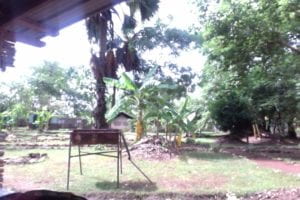Rebecca Haque
Handicap International
Yei, South Sudan
In the first weeks of July, one of my responsibilities was to help organize an awareness raising session on disability, with local authorities and disabled people’s organizations (DPOs) in Yei. Ironically, our venue was not accessible to PWDs, but was the “most accessible” in the spectrum of accessibility in venues around. One of the individuals in the DPO groups, paralyzed from the waist down, had to crawl from his tricycle to his seat in the conference hall. Later as we were sitting outside the lunch hall he couldn’t access, he tells me that this was a pretty good way to drive home the point to the authorities in attendance that action is needed, pretty desperately, to allow people with disabilities dignified access to basic service providers.
Our mobile team facilitated the presentations and I felt overwhelming envy with the ease with which they navigated and disseminated the information in English, Kakua (apart of the Bari language group) and South Sudanese Arabic. During quiet moments in the office, I find myself contemplating the complexity of their jobs. They are the meeting point between HI’s internationally standardized and locally categorized definitions of disability. Their day-to-day operations are completed in three languages. They have the phenomenally difficult task of reconciling the international rights conventions such as the CRPD and the Cluster Munitions Treaty with the notions of disability that they’ve grown up around and continue to live in. It is fascinating for me to watch their compromise, their adaptation to the human rights rhetoric that I take for granted. I can only hope that they will be a larger reflection of what our project will do to the consciousness of the communities we are operating in.
A theme of the discussions that emerged following the presentations were the differences between the “old Sudan” and the new. Notions regarding statehood, and the protection of citizen’s rights by the government are also present in the general assessments that we do in the community. Unprompted, people with disabilities are invoking their government’s responsibility to support and recognize them. This makes me swell with hope every time I come across it. Even with minimal socialization to the human rights discourse, I realize it was embarrassingly naïve of me to think that the same notions about rights do not exist in less formal articulations.
(I realize I am absolutely failing with photographs, but it’s a tricky
issue here, with the suspicion surrounding media, as well as the vulnerability of the population I’m working with. But here’s a picture of the compound I live on!)
